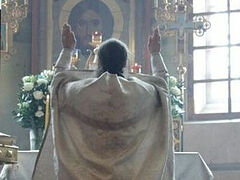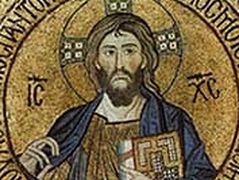From childhood our parents teach us the magic words: “thank you”, “please” and “sorry”. Some learn these lessons perfectly well, but others, alas, forget to thank their loved ones for a delicious dinner or a fresh shirt. And we must admit that we do not often say words of gratitude to our Savior. We often ask, sometimes even demand, but rarely say from the bottom of our hearts: “Thank you, Lord! Glory to God for all things”. The Holy Church tells us about several types of prayers: petition, thanksgiving and praise. Everything is simple with the first one. We pray for good health for ourselves and our loved ones, for material prosperity and love. But how often do we express gratitude to God?
Yesterday, January 11 was International Thank-You Day, Priest Anthony Borisov, Master of Theology, Associate Professor of the Moscow Theological Academy, talks about gratitude to the Creator.
—Father Anthony, entering a church shop and seeing the number of intercession lists submitted, we understand that people often ask priests to pray for the health and the repose of their loved ones, while there are very few thanksgiving services. Can we say that gratitude is a quality that should be cultivated? Or is it an inner attunement to the ability to talk to God and be grateful for everything?
—It’s pretty hard to generalize. I am not ready to speak for the entire human race and will only try and single out some common features of human nature inherent in all of us. Let’s start with the Gospel text. Of the miracles that Christ performed during His earthly life I would mention the miracle of the healing of the ten lepers. As attentive readers of the Gospel remember, when the ten lepers, after being healed by Christ, felt that they were healthy again, nine of them ran home joyful. Only one of the lepers returned to Christ and thanked Him for healing. This leper turned out to be a Samaritan, a man of a different nationality than the Lord Jesus. And Christ asked this man with surprise: Were there not ten cleansed? but where are the nine? (Lk. 17:17). Why did only one foreigner come to give thanks to God?
Indeed gratitude is a habit that you have to work hard to acquire. When we feel bad and melancholy, our whole state inevitably impels us to turn to people or to God for help. We are afraid to experience this state of grief alone. But when everything in our lives seems to be fine, for some reason it seems to us that we do not need to share this joy, light, and love with anyone and we do not need to thank anyone for our peace of mind and joy. The greed that we experience at this moment ultimately does not allow us to maintain the state that we have. And even worse: egoism ultimately eats it away, bringing it to naught. And when we thank God or our neighbor for the good done to us, not only does it not disappear and decrease, but, on the contrary, is added to, it expands and increases. Everything happens exactly as the Book of Ecclesiastes says: Cast thy bread upon the waters: for thou shalt find it after many days (Eccl. 11: 1). Not only does thanksgiving not reduce joy and light, but, on the contrary, it allows you to enjoy them truly. But this needs to be tested in practice. In theory, this is quite difficult to teach.
If you look at the sayings of the Holy Fathers on thanksgiving, you can see how much attention they paid to thanksgiving and gratitude: Sts. Maximus the Confessor, Basil the Great, Ignatius (Brianchaninov) and many others. And how they condemn callousness and ingratitude! Because the ability or inability to give thanks is a very sure sign of whether you truly live a spiritual life or perceive God or your neighbor as some idol, genie, or “tool” that only fulfills your desires. And when everything on your wish list has been achieved, it seems strange to thank this “tool”. For example, we do not thank a wrench for unscrewing a nut. If you are obsessed with your happiness, forgetting Who the source of happiness is, then you reduce God to the level of a means of fulfilling your desires that you then can “shelve for a time”.
—The Apostle Paul taught: Rejoice evermore. Pray without ceasing. In every thing give thanks (1 Thess. 5:16-18). But we usually thank God for significant events, say, for a successful operation or the recovery of one of our family members, but we often forget to thank God for daily little things. In the morning and the evening prayers we read words of gratitude written by the Holy Fathers who compiled these prayers, but, as a rule, our hearts do not really respond to these. Should the ability to thank God for everything be cultivated as well?
—Of course, like many other virtues. We must understand that, unfortunately, this is how one of the laws of reality distorted by evil manifests itself—everything bad easily clings to us. Sometimes you don’t even notice how you have acquired this or that sinful habit. And all good things always come with difficulty. This is not because God is so greedy that He cannot bestow upon us these great gifts of virtue, but because such is human nature. We value only what we have gained with difficulty.
Returning to the Patristic understanding of gratitude and thanksgiving, the wonderful words of St. John Chrysostom come to mind: “Nothing is so agreeable to God as a grateful and thankful soul.” And elsewhere he writes: “Gratitude adds nothing to God, but brings us closer to Him.” This is a very important remark, which indicates that God does not need our thanksgiving. He doesn’t need anything at all. But God wants us to need Him. Not because the Lord is capricious or selfish—not at all. Because only in union with God can we find true happiness, even when external circumstances try to prevent it. In the Person of the Lord Jesus Christ, the Son of God, Who came into our world and became a Man, we see an example of amazing gratitude to God. In the Gospel of John we read the words of the High Priestly Prayer of Christ: the Lord Jesus, feeling all the sorrow of the trials and torments that awaited Him, nevertheless thanked God the Father for the amazing gift of grace that had again been given to the world through His incarnation. In the Person of Christ we see how the fear of Golgotha recedes, giving way to trust and gratitude to His Divine Parent.
—If the Lord, as you say, does not need our gratitude, then what would be the best gratitude from someone who wants to thank the Lord: words of prayer, almsgiving or a good deed?
—Well, all of the above! The most important thing is that it should come from your heart and not be just a formal fulfillment of certain prescriptions, a list of rules. It shouldn’t look like instructions from a furniture store: “if you want to assemble a bedside table, follow these steps.” The Orthodox Church gives us pastoral advice in the person of the Holy Fathers, criticizing any manifestation of formality and magic. For example, St. Nicodemus the Hagiorite talked about how we can give thanks to God, “God does not need your gratitude, but you desperately need His blessings. Your grateful heart receives and preserves these benefactions.”[1] These words mean that only a person with a grateful heart can be both a keeper of the Divine gifts of grace and their spreader to the world. When we thank God, even if in the simplest way, let us not be embarrassed.
If we act sincerely—even though we pray somehow clumsily, cannot show creativity in prayer, our actions seem insignificant to us and we give alms in small amounts, albeit within our power, with the desire to thank God for His blessings—then this small, modest thanksgiving will be accepted by God. This is precisely the meaning of one of the sayings of Elder John (Krestiankin).
When would people ask for his advice, he would answer, “Work our your salvation by doing little good deeds.” Because some people live with the illusion that today they have done nothing good, like yesterday, but a wonderful significant day will come when they will do a global good deed, and for this they will inherit the Kingdom of God. But this is self-delusion, with which people often captivate their inner selves and live in its snares without doing anything in their lives.
—Am I correct in assuming that it is better to say once and sincerely, “Thank You, Lord!”, than to do something automatically, without investing your soul, heart and mind in that?
—Yes, definitely.
—If we look at the morning and the evening prayers closely, we can see that they are permeated with gratitude to God. But people usually pray for the salvation of their relatives, for the repose of their loved ones, for peace of mind for the day or give thanks for the day lived without paying much attention to words of gratitude. Maybe we should focus more on this, and it will be a form of conversation with the Lord?
—People often come to me asking why a certain prayer is burdensome to them, and sometimes they don’t understand what they really want and don’t know how to pray correctly. I ask these people what they mean when they say “a prayer rule”. They usually answer that it is a duty, obedience, something that must be fulfilled. But in fact, if we look at the meaning of the word “rule” in Russian, which is “pravilo”, we will find an interesting thing. This word is translated from Slavonic as “template” or “pattern”. This means that the Church has collected in the Prayer-Book the best examples of Patristic prayers.
But despite the fact that these are the best examples, these words still remain alien to us as it is someone else’s prayer experience. And the meaning of the prayer rule is that, having come into contact with the experience of Patristic prayer, we learn to pray on our own. And thanksgiving is the highest form of prayer commanded to us by God and the Church. After all, the most important sacrament of the Church is the Eucharist, and it means “to give thanks” in Greek.
—Unfortunately, few become sufficiently spiritually mature to give thanks in prayer. And we should feel gratitude not only to God, but also to people around us. This raises the question of how we behave in church. The theme of gratitude to those who pray with us remains relevant.
—I understand that it is about good manners rather than thankfulness. Courtesy is not always in favor with the Orthodox—it is often suspected of people-pleasing, insincerity, and falseness. Many believers think that it is better to say directly what you think about your neighbor than to be diplomatic. But, as a rule, it is not truthfulness that is justified by condemnation of politeness, but rudeness, which is passed off as straightforwardness, sincerity and the absence of guile. The Old and New Testaments testify to us how important it is to be polite to everybody, and not just to your co-religionists. For example, in the book of Proverbs of King Solomon we find a wonderful saying: A man that hath friends must shew himself friendly: and there is a friend that sticketh closer than a brother (Prov. 18:24). And the Apostle Paul writes: Put on therefore, as the elect of God, holy and beloved, bowels of mercies, kindness, humbleness of mind, meekness, longsuffering; Forbearing one another, and forgiving one another, if any man have a quarrel against any: even as Christ forgave you, so also do ye. And above all these things put on charity, which is the bond of perfectness. And let the peace of God rule in your hearts, to the which also ye are called in one body; and be ye thankful (Col. 3:12-15).
When it comes to the importance of courtesy and warm relations, the Apostle Paul also wrote: Be kindly affectioned one to another with brotherly love; in honour preferring one another (Rom. 12:10). How can this be implemented in practice? Among the writings of St. Ambrose of Milan there is a description of the Mother of God. Of course, St. Ambrose did not see the Theotokos with his own eyes, but he recorded the ancient Church tradition about how the Mother of God looked and behaved: “Her rule was not to insult anyone, to be well-disposed to everyone, to honor elders, not to envy equals, to avoid boasting, to be sensible and to love virtue. Did She ever offend or disagree with Her relatives in the slightest, if only by Her facial expression, or was She ever haughty with a lowly person, or did She laugh at the weak, or pass by the poor? She had nothing stern in Her eyes, nothing imprudent in Her words, and nothing improper in Her actions.”
What wonderful words St. Ambrose of Milan used in relation to the Virgin Mary! If the Theotokos was polite and grateful to others and in every possible way avoided offending or hurting someone, then we need to do the same. The importance of being courteous and friendly was noted even by such stern Desert Fathers as, for example, St. Ephraim the Syrian. In his writings, addressing other monks, he said: “Do not do what saddens your neighbor, but be civil in dealing with everyone.” If the strict ascetics advise us to act in this way, then we, who live in the world, must be guided by these instructions all the more.
—All we need is to accept all these instructions with our hearts and not be upset because of petty things, which can put us out of temper. Unfortunately, it often happens that we come to church filled with happiness and joy, but something goes wrong and we immediately give vent to anger or what we have inside. Sadness appears in the heart as you understand the superficial and ostentatious in yourself.
—In order not to lose heart and become a victim of despondency due to your own imperfection it is important to remember that St. Clement of Alexandria called the Lord a Great Teacher. God never tries to offend or discourage us. If life circumstances are such that we do not behave in the best way, it means that He has arranged them this way so that we may understand what we should work on.
—So we need to perceive this not as a reason for self-condemnation, but for reform?
—Surely. As many ascetics of the Orthodox Church repeated: “A saint is not someone who does not sin but someone who repents.” According to the Holy Fathers, repentance is not just regret, but active reform and improving your life in accordance with the commandments of God.




